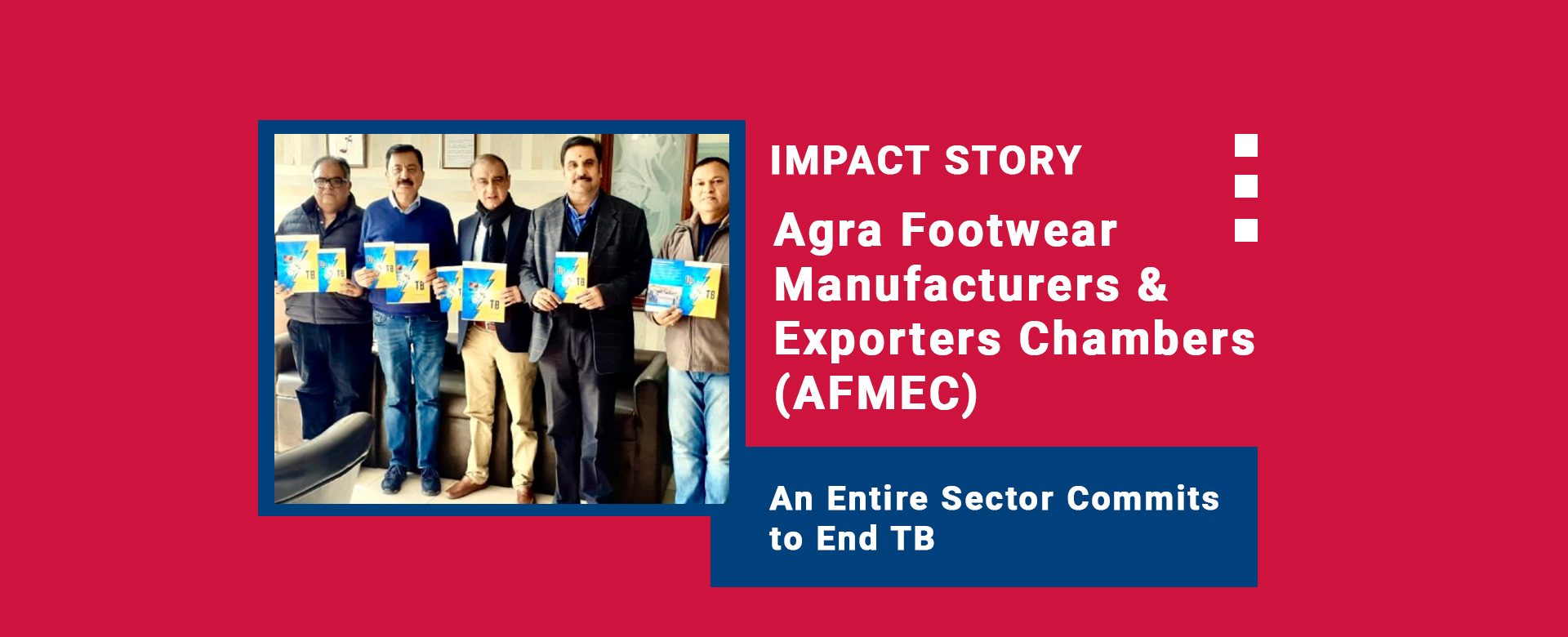
An Entire Sector Commits to End TB
The Footwear sector is a very significant segment of the leather industry in India, exporting footwear close to US$ 2500 million. The historic city of Agra is the biggest footwear cluster of India, providing employment to about 4,00,000 people. Agra Footwear Manufacturers & Exporters Chambers (AFMEC) is an organization working with the entire industry in Agra bringing together more than 1,200 companies with an outreach to over 3,00,000 employees.
Unfortunately, Agra is also increasingly becoming popular for it’s TB burden. In 2019 itself, Agra ranked 2nd in disease burden across the state of Uttar Pradesh with 23,157 new TB Cases being reported to the government. Of these, 13,515 (almost 60%) were patients seeking care in the private sector, most of whom are not availing the benefits of the National TB Program.
Intervention
AFMEC was keen to address the problem and in January 2020, signed the Corporate TB Pledge (CTP). Equipped with the technical support extended to CTP members, it committed to spread awareness on the issue as well as allocate resources to cater to the pressing needs of its labour intensive fraternity.
With a missionary zeal, interventions were initiated and within a month of becoming a member a sensitization workshop was organized wherein CEOs, Health & Safety Officers and the HR Heads of member organizations were sensitized on TB, National TB Elimination Program (by a state official) and the Corporate TB Pledge by technical resource personnel of CTP (USAID, The Union and IPE Global). They were informed of the benefits of becoming a member – ready resource material, technical support for TB initiatives as well as a platform for cross-learning between network of corporates committed to the cause of TB Free Work Places. AFMEC graciously hosted the event for educating it’s members.
The success of training was indicated, when 14 member organizations of AFMEC signed the CTP and committed to protecting their employees from TB. These organizations were serviced by CTP team with IEC material (translated to local language), which has been adapted and displayed across common access areas, canteens, factories entry/exit points etc. by member organizations. Dialogue is further being pursued with individual companies on providing tailored solutions for TB interventions as per their needs and requirements.
Impact
The leadership shown by the governing body of AFMEC – has motivated member organizations to prioritize TB Care amongst their employees and communities. Footwear industry is labor intensive and the impact of a federation taking ownership of the issue will spiral with each member becoming active in the region.
AFMEC
- Commits to TB – signs Corporate TB Pledge
- Encourages members to prioritize TB Care
- CTP sensitizes member organization CEOs, Health & Safety Officers, HR Heads
Member Organizations
- Commit & Sign Corporate TB Pledge
- Start getting serviced as CTP members
CTP Members
- Receive resources such as IEC materials, TB Free Work Place Policy drafts, outreach material, etc.
- Received technical support for sensitization of employees and their families, program design on TB, CSR support, etc.
Key Lessons
Agra is a densely populated area with a very high TB burden. To address this, it is imperative that the National TB program is supported by local champions and influencers. When a cohesive body of companies/organizations like AFMEC prioritizes the disease and provides critical community leadership and ownership, the impact will be manifold.
This model’s success is hinged on the premise that it‘s access to an entire sector that is labor intensive and has high risk population will have a significant impact with appropriate interventions. AFMEC provides a well-structured platform to access many companies of varied sizes. When each company will undertake TB initiatives – motivated by it’s own network of peers with technical support of CTP, it will benefit hundreds and thousands of employees working across its units.
AFMEC itself is leading the way, by undertaking initiatives directly. It plans to introduce a van equipped with X-Ray and CBNAAT machine that will move across companies to increase case detection.